Related Research Articles
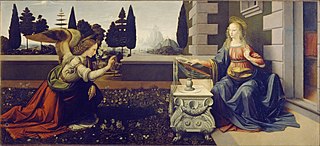
In Abrahamic religions, Gabriel is an archangel with power to announce God's will to men. He is mentioned in the Hebrew Bible, the New Testament, and the Quran. Many Christian traditions — including Catholicism, Eastern Orthodoxy, and Anglicanism — revere Gabriel as a saint.
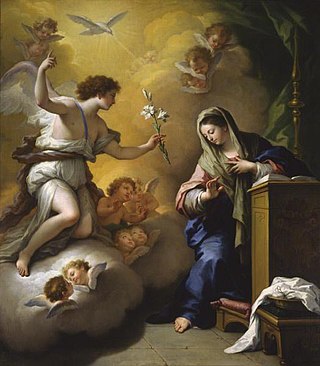
Archangels are the second lowest rank of angel in the hierarchy of angels. The word "archangel" itself is usually associated with the Abrahamic religions, but beings that are very similar to archangels are found in a number of other religious traditions.
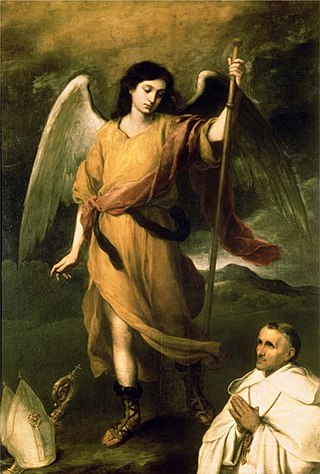
Raphael is an archangel first mentioned in the Book of Tobit and in 1 Enoch, both estimated to date from between the 3rd and 2nd century BCE. In later Jewish tradition, he became identified as one of the three heavenly visitors entertained by Abraham at the Oak of Mamre. He is not named in either the New Testament or the Quran, but later Christian tradition identified him with healing and as the angel who stirred waters in the Pool of Bethesda in John 5:2–4, and in Islam, where his name is Israfil, he is understood to be the unnamed angel of Quran 6:73, standing eternally with a trumpet to his lips, ready to announce the Day of Judgment. In Gnostic tradition, Raphael is represented on the Ophite Diagram.

Michael, also called Saint Michael the Archangel, Saint Michael the Taxiarch in Orthodoxy and Archangel Michael is an archangel in Judaism, Christianity, Islam and the Baha'i faith. The earliest surviving mentions of his name are in 3rd- and 2nd-century BC Jewish works, often but not always apocalyptic, where he is the chief of the angels and archangels and responsible for the care of Israel. Christianity adopted nearly all the Jewish traditions concerning him, and he is mentioned explicitly in Revelation 12:7–12, where he does battle with Satan, and in the Epistle of Jude, where the author denounces heretics by contrasting them with Michael.

Uriel or Auriel is the name of one of the archangels who is mentioned in the post-exilic rabbinic tradition and in certain Christian traditions. He is well known in the Russian Orthodox tradition and in folk Catholicism and recognized in the Anglican Church as the fourth archangel. He is also well known in European esoteric medieval literature. Uriel is also known as a master of knowledge and archangel of wisdom.

The Hebrew name Jerahmeel, which appears several times in the Tanakh, also appears in various forms as the name of an archangel in books of the intertestamental and early Christian periods.
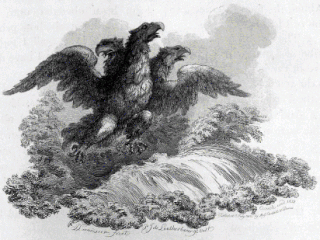
2 Esdras is an apocalyptic book in some English versions of the Bible. Tradition ascribes it to Ezra, a scribe and priest of the fifth century BCE, but scholarship places its composition between 70 and 218 CE.
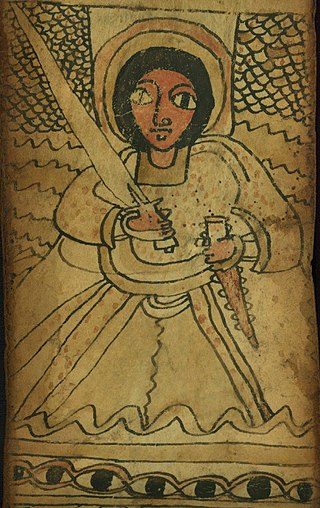
Phanuel is the name given to the fourth angel who stands before God in the Book of Enoch, after the angels Michael, Raphael, and Gabriel. Other spellings of Phanuel include Panuel,Paniel, Peniel, Penuel, Fanuel and Feniel. As Panuel his name means "God has turned", but as Paniel his name means "God is my face".
Ramiel is a fallen Watcher (angel) not to be confused with the holy angel "Remiel” who is an Archangel in the apocryphal Book of Enoch. Ramiel [Watcher] mentioned in [Chapter 7], is one of the 20 Watchers (angels) that sinned and rebelled against God by mating with a human woman and creating an offspring called Nephilim. Remiel [Archangel] is mentioned later on in [Chapter 20], as one of the seven holy angels who watch; the angel whom God set over those who rise. Remiel is also known as Jeremiel in certain translations of 2 Esdras.

The concept of Seven Archangels is found in some works of early Jewish literature and in Christianity. In those texts, they are referenced as the angels who serve God directly.
In Judaism, angels are supernatural beings that appear throughout the Tanakh, rabbinic literature, apocrypha and pseudepigrapha, and traditional Jewish liturgy as agents of the God of Israel. They are categorized in different hierarchies. Their essence is often associated with fire. The Talmud describes their very essence as fire.
In some Judeo-Christian traditions, the Angel of the Presence / Face or Angel of his presence / face refers to an entity variously considered angelic or else identified with God himself.

In various theistic religious traditions, an angel is a supernatural spiritual being who serves God.
Gabuthelon is an angel mentioned in the Greek Apocalypse of Ezra whose name was revealed to Esdras as one of the nine angels who will govern "at the end of the world." The nine angels mentioned are: Michael, Gabriel, Uriel, Raphael, Gabuthelon, Aker, Arphugitonos, Beburos, and Zebuleon. Gabuthelon is not considered an archangel and is a non-canonical figure.
Aker is an angel mentioned in the Greek Apocalypse of Ezra whose name was revealed to Esdras as one of the nine angels who will govern "at the end of the world." The nine angels mentioned are: Michael, Gabriel, Uriel, Raphael, Gabuthelon, Aker, Arphugitonos, Beburos, and Zebuleon. Aker is not considered an archangel and is a non-canonical figure. Theologians surmise that Aker may be comparable to Kyr.
Arphugitonos is an angel mentioned in the Greek Apocalypse of Ezra whose name was revealed to Esdras as one of the nine angels who will govern "at the end of the world." The nine angels mentioned are: Michael, Gabriel, Uriel, Raphael, Gabuthelon, Aker, Arphugitonos, Beburos, and Zebuleon. Arphugitonos is not considered an archangel and is a non-canonical figure.
Beburos is an angel mentioned in the Greek Apocalypse of Ezra whose name was revealed to Esdras as one of the nine angels who will govern "at the end of the world." The nine angels mentioned are Michael, Gabriel, Uriel, Raphael, Gabuthelon, Aker, Arphugitonos, Beburos, and Zebuleon. Beburos is not considered an archangel and is a non-canonical figure.

Saint Michael the Archangel is referenced in the Old Testament and has been part of Christian teachings since the earliest times. In Catholic writings and traditions he acts as the defender of the Church and chief opponent of Satan, and assists people at the hour of death.
The Magical Treatise of Solomon, sometimes known as Hygromanteia or Hygromancy of Solomon, the Solomonikê (Σολομωνική), or even Little Key of the Whole Art of Hygromancy, Found by Several Craftsmen and by the Holy Prophet Solomon, refers to a group of similar late Byzantine-era grimoires purporting to contain Solomon's instructions to his son Rehoboam on various magical techniques and tools to summon and control different spirits, those spirits' powers, astrological beliefs, select charms, different means of divination, and the magical uses of herbs.
References
- ↑ Walker, Alexander (1886). Roberts, Alexander (ed.). Ante-Nicene Fathers: The Writings of the Fathers Down to A.D. 325. Vol. 8. James Donaldson and A. Cleveland Coxe. Buffalo, NY: Christian Literature Publishing Co. Retrieved October 20, 2011.
Do you know, Esdras, the names of the angels at the end of the world? Michael, Gabriel, Uriel, Raphael, Gabuthelon, Aker, Arphugitonos, Beburos, Zebuleon.
- ↑ The Old Testament Pseudepigrapha: Apocalyptic Literature & Testaments. Edited by James H. Charlesworth